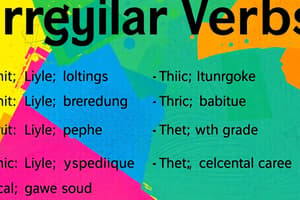Podcast
Questions and Answers
Which of the following is the past tense form of the verb 'go'?
Which of the following is the past tense form of the verb 'go'?
- goes
- gone
- going
- went (correct)
What is the past participle form of the verb 'see'?
What is the past participle form of the verb 'see'?
- saw
- seen (correct)
- seeing
- sees
Identify the correct past tense form of the verb 'take'.
Identify the correct past tense form of the verb 'take'.
- take
- took (correct)
- taking
- taken
Which verb has the past participle form 'broken'?
Which verb has the past participle form 'broken'?
What is the present tense form of the verb 'give'?
What is the present tense form of the verb 'give'?
Which of the following best describes irregular verbs?
Which of the following best describes irregular verbs?
What is the past tense of the verb 'run'?
What is the past tense of the verb 'run'?
Which verb has the same form for its past tense and past participle?
Which verb has the same form for its past tense and past participle?
Flashcards
Irregular Verbs
Irregular Verbs
Verbs that do not follow standard tense changes (past tense and past participle).
Be (verb)
Be (verb)
Present tense: am, is, are; past tense: was, were; past participle: been
Have (verb)
Have (verb)
Present tense: have, has; past tense: had; past participle: had
Do (verb)
Do (verb)
Signup and view all the flashcards
Go (verb)
Go (verb)
Signup and view all the flashcards
See (verb)
See (verb)
Signup and view all the flashcards
Say (verb)
Say (verb)
Signup and view all the flashcards
Take (verb)
Take (verb)
Signup and view all the flashcards
Bring (verb)
Bring (verb)
Signup and view all the flashcards
Break (verb)
Break (verb)
Signup and view all the flashcards
Choose (verb)
Choose (verb)
Signup and view all the flashcards
Come (verb)
Come (verb)
Signup and view all the flashcards
Feel (verb)
Feel (verb)
Signup and view all the flashcards
Get (verb)
Get (verb)
Signup and view all the flashcards
Give (verb)
Give (verb)
Signup and view all the flashcards
Know (verb)
Know (verb)
Signup and view all the flashcards
Make (verb)
Make (verb)
Signup and view all the flashcards
Run (verb)
Run (verb)
Signup and view all the flashcards
Tell (verb)
Tell (verb)
Signup and view all the flashcards
Think (verb)
Think (verb)
Signup and view all the flashcards
Write (verb)
Write (verb)
Signup and view all the flashcards
Find (verb)
Find (verb)
Signup and view all the flashcards
Study Notes
Irregular Verbs
- Irregular verbs are verbs that do not follow the typical conjugation patterns in their different tenses.
- Their past tense and past participle forms are not predictable from the present form.
- Mastering irregular verbs is crucial for understanding and using English effectively. Learning the specific forms is essential.
- A core skill in language acquisition is the identification and memorisation of irregular verb forms.
- They appear frequently in both spoken and written English.
- Examples of irregular verbs are important to learn.
Common Irregular Verbs
- Be: present tense forms: am, is, are; past tense: was, were; past participle: been
- Have: present tense: have, has; past tense: had; past participle: had
- Do: present tense: do, does; past tense: did; past participle: done
- Go: present tense: go; past tense: went; past participle: gone
- See: present tense: see; past tense: saw; past participle: seen
- Say: present tense: say; past tense: said; past participle: said
- Take: present tense: take; past tense: took; past participle: taken
- Bring: present tense: bring; past tense: brought; past participle: brought
- Break: present tense: break; past tense: broke; past participle: broken
- Choose: present tense: choose; past tense: chose; past participle: chosen
- Come: present tense: come; past tense: came; past participle: come
- Feel: present tense: feel; past tense: felt; past participle: felt
- Get: present tense: get; past tense: got; past participle: gotten/got
- Give: present tense: give; past tense: gave; past participle: given
- Know: present tense: know; past tense: knew; past participle: known
- Make: present tense: make; past tense: made; past participle: made
- Run: present tense: run; past tense: ran; past participle: run
- Say: present tense: say; past tense: said; past participle: said
- Tell: present tense: tell; past tense: told; past participle: told
- Think: present tense: think; past tense: thought; past participle: thought
- Write: present tense: write; past tense: wrote; past participle: written
- Find: present tense: find; past tense: found; past participle: found
Strategies for Learning
- Create flashcards: write the verb in the present tense, past tense, and past participle on each card.
- Use a variety of learning resources: textbook, online exercises, and language learning apps.
- Practice regularly: use the verbs in sentences to reinforce learning.
- Focus on the specific patterns within each tense and look for any similarities.
- Create sentences using each irregular verb in different grammatical contexts.
- Make lists of frequent irregular verbs.
- Try to group related verbs together in your memorization.
- Engage in discussions to use the verbs naturally.
- Review regularly and revisit those verbs you struggle with.
Studying That Suits You
Use AI to generate personalized quizzes and flashcards to suit your learning preferences.




